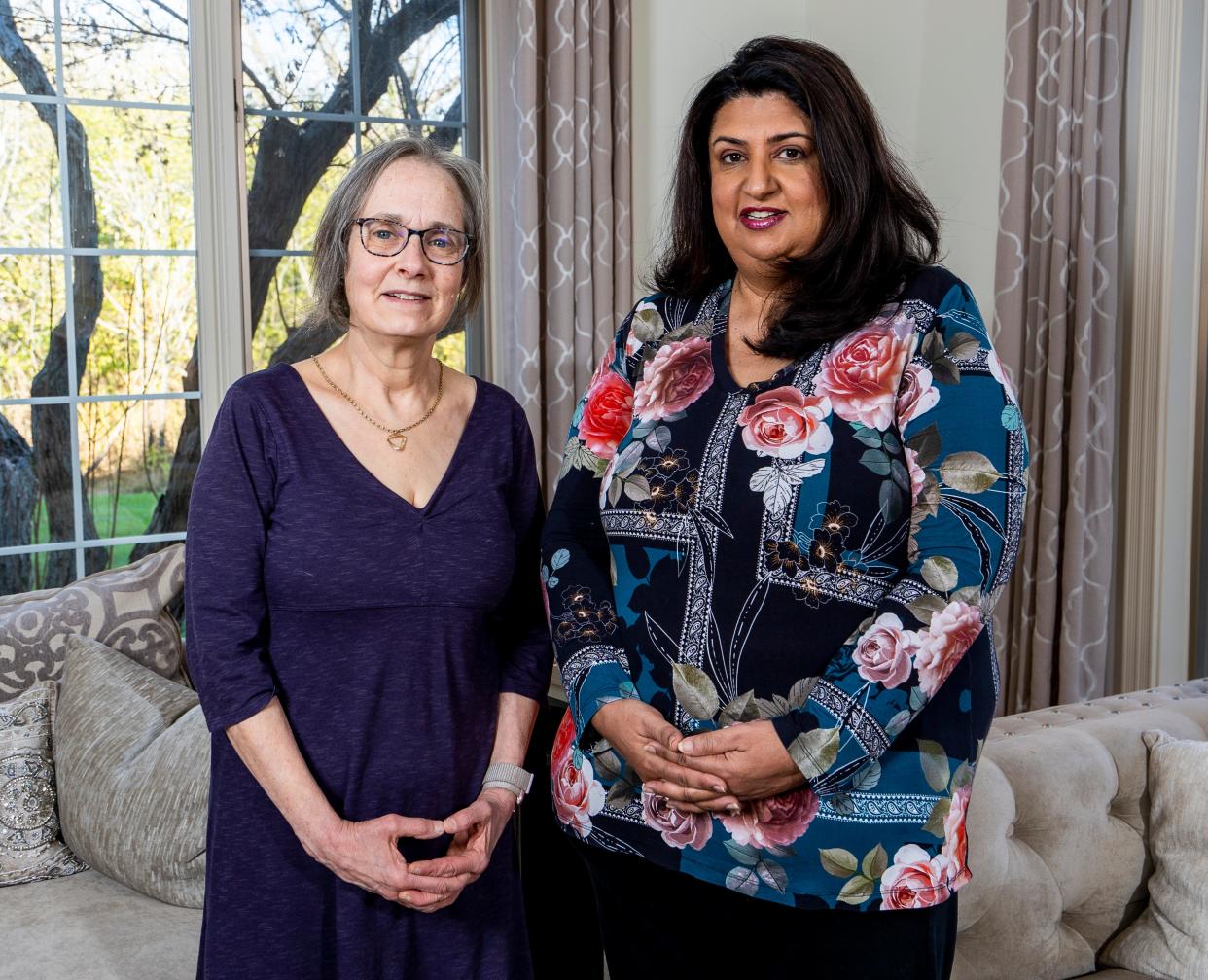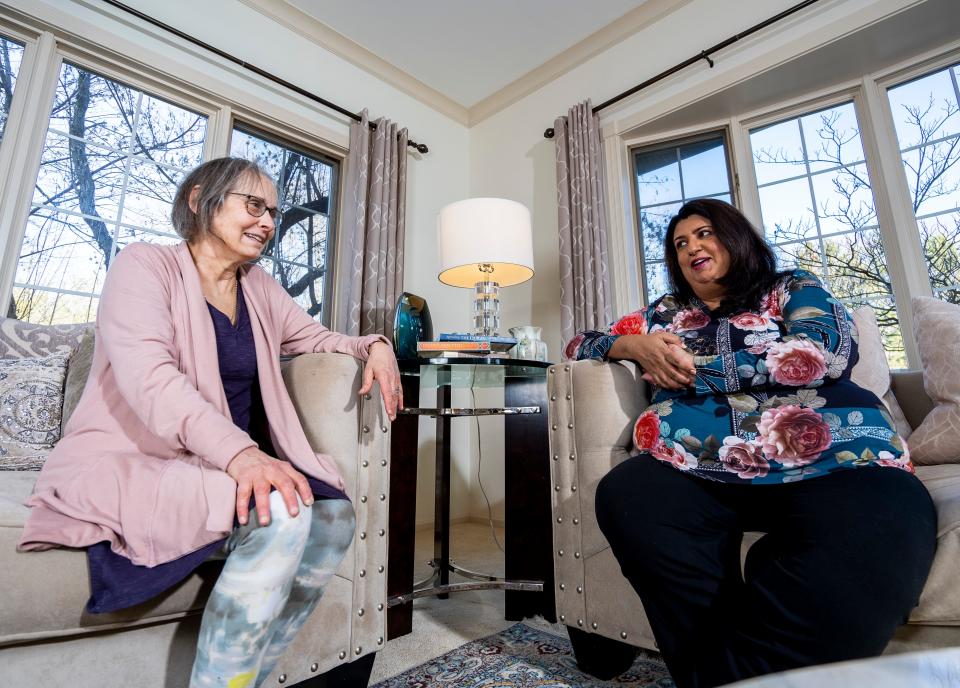Jewish, Muslim women in Milwaukee built friendship over years. Now, during war, they are grateful to have each other.

For years, a Milwaukee-area group of Jewish and Muslim women have built friendships across a religious divide.
They've served Christmas dinners to people in need. They've cleaned up trash on Earth Day. And they've found common ground on politics, family, and life in a city where Christianity is the dominant faith.
But after Hamas attacked Israeli towns Oct. 7 and Israel began bombing Gaza, one of the Muslim women posted details about a pro-Palestinian rally in their group chat. A few of the Jewish women fired back, hurt that she hadn't seemed to acknowledge the horror of Hamas' massacre.
Group leaders shut down the group chat for a few days, instituting a cooling-off period. But soon, people began reaching out directly to each other, offering words of comfort in their shared pain. Ultimately, they were friends, and they understood what the other person was going through.
We need each other, they texted. We're so grateful for each other.
The Sisterhood of Salaam Shalom, a national organization with chapters around the country, counts about 30 women in its Milwaukee group. For Tehmina Akbar of Mequon and Amy Waldman of Milwaukee, engaging in interfaith dialogue is essential. It's felt fruitful over the years to build relationships with each other and learn how to discuss their differences civilly, they said.
But Israel-Hamas war presents their toughest challenge yet.
"We're still in the eye of the storm," Akbar said in a joint interview with Waldman. "Every day, there's more and more people being killed."
She's concerned about simmering anger at the ongoing violence that could boil over easily. Ahead of their next meeting in December, she has been researching tactics for having difficult conversations.
"People have to understand that everybody in your group is not going to have your opinion. You have to be able to say, OK, I can sit down at the table with these 20 women and disagree with them," Akbar said.
The key, Waldman said, is the trust the women have built over the last six years as a group.
"This isn't a group of strangers," she said.
That basis of friendship, and knowing that "their heart is in the right place," makes it easier to bring up something hard to hear, Waldman said.
Akbar concurred. Say she disagreed on some point with Waldman. It wouldn't be cause for a friendship-ending argument.
"I know her, and I know that she wants peace, and she wants peace for all people," Akbar said. "She believes in the equality of all people."
More: Palestinian-Americans in Milwaukee helpless as relatives in Gaza fear death is imminent
More: On visit to Israel, Milwaukee Jewish leader sees resilience in the face of continuing trauma
Fueled by interest in other faiths, Jewish, Muslim women formed group
Akbar and Waldman note that their local group is not representative of every viewpoint. There are no Palestinian-American women in the group, and no Jewish women who identify as more conservative or orthodox. They're a group that largely skews liberal on politics.
But they're a group with a keen interest in reaching across the aisle.
Born in Pakistan, Akbar immigrated to the U.S. as a child with her family. Religion and politics were topics of great interest around the dinner table while growing up in Elm Grove, and Akbar took that curiosity into her adult life.

She earned a bachelor's degree in international studies, focusing on the Middle East and North Africa, and a master's in Islamic studies. For years, she saw how much American Jews and Muslims had in common, but regretted the two communities didn't have many chances to meet and interact.
A tipping point came at a national Islamic conference, when four Jewish panelists fielded question after question about Israel from Muslim attendees, as if that were the only relevant topic. Akbar left frustrated. It felt like more of the same thing she'd always heard.
When she heard about the Sisterhood organization, and learned a chapter was starting in Milwaukee, she was eager to join.
"For such a long time, I really wanted there to be a group like this," she said. "I just jumped on the bandwagon right away."
Today, she is co-leader of the Milwaukee chapter, and was just named to the national board of the Sisterhood.
Waldman was similarly intrigued by the group's concept. She's been interested in Israel, Palestinians and questions of religion for years. Now a Milwaukee librarian, she grew up in one of the handful of Jewish families in Utica, New York, the daughter of a rabbi. When she did a year-long study program in Israel as a young adult, she asked to study Arabic as well as Hebrew, and she sought to befriend Arab families.
When she read about the Sisterhood organization, it was a "'where have you been all my life?' situation," she said.
Once the group formed in 2017, they followed the national group's guidance not to broach the Israeli-Palestinian state of affairs for at least a year and a half. They should build a strong base of friendship first, the thinking went.
"We were all born into a conflict that's been going on for thousands of years," Waldman said.
"No, not thousands of years. I have to stop you there," Akbar responded. "It's basically a political conflict that started after 1947."
"I would go back to 1917 and the Balfour Declaration," Waldman replied, referencing the British statement of support for a home for the Jewish people in Palestine. "I lay it mostly at the feet of the British Empire."
A bit of respectful discussion on specific historical points followed. It was the kind of interaction the women are expecting to have again and again as they continue to process the current war.
More: Franklin man loses 32 relatives in Gaza airstrike. A beloved aunt and an infant are among the dead.
Devastation of Israel-Hamas war evokes sense of shared pain
Compassion and empathy are key to all their interactions, the women said.
They've all seen the rise in antisemitism and Islamophobia over the last several years. They all feel close cultural and religious ties to the Middle East. And they've all watched with great concern what has unfolded in Israel and Gaza since Hamas attacked Oct. 7.
"We’re seeing exactly the same thing in mirror image," Waldman said.
As Jewish and Muslim activists speak out on the war, that sentiment of shared pain is rarely heard. People are angry. On campuses, at protests and on social media, where tensions are high, it seems as if there's been little effort to reach out in good faith to the other side.
Waldman and Akbar emphasize their views don't represent all Jews or all Muslims, both diverse groups with a wide range of opinions. And they both agreed that 30 women in Milwaukee engaging in civil dialogue won't change an issue that's stymied the Middle East and, to some degree, the world.
But it's a start.
If they want things to be different for the next generations, both women said, they have to start building bridges, even in the most challenging times.
This article originally appeared on Milwaukee Journal Sentinel: For Jewish, Muslim women's group in Milwaukee, talking is key to peace

